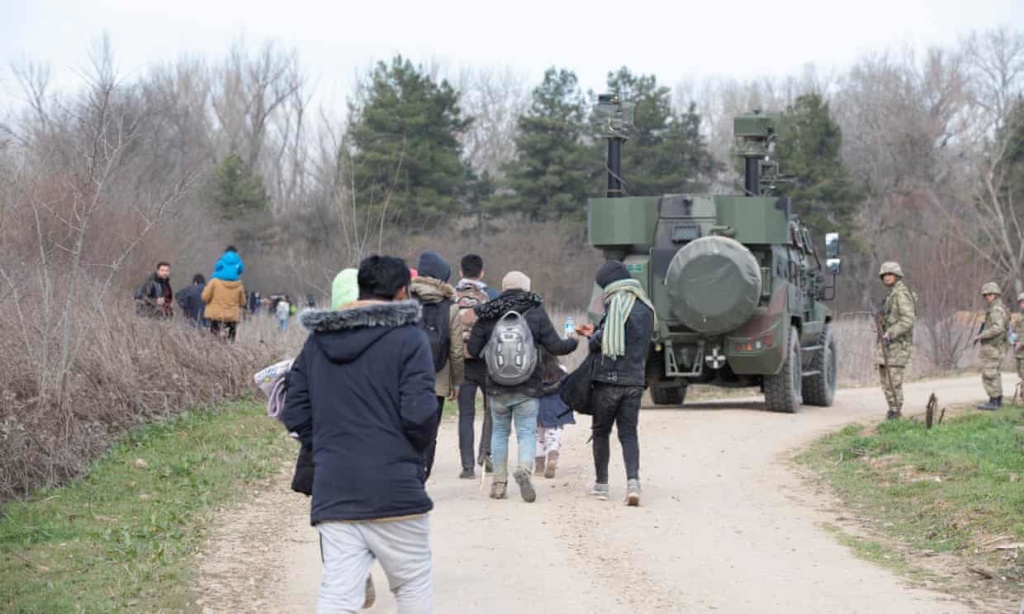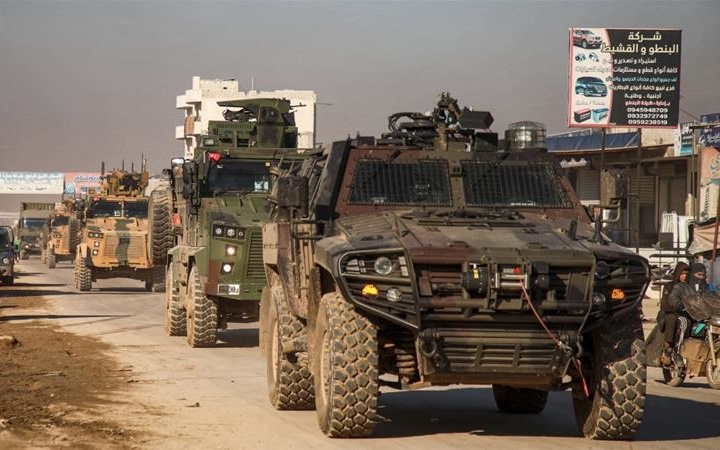A Turkish military convoy moving in Idlib Province in northwest Syria, January 2020 (Aaref Watad/AFP)
Jump to Original Entry
UPDATE, 1250 GMT:
After a phone call between Turkish President Recep Tayyip Erdoğan and Russian counterpart Vladimir Putin, Russia has tried to divert from the killing of 33 Turkish soldiers with a statement about coordination to fight “terrorists”.
Foreign Minister Sergey Lavrov insisted, “The distinction of terrorists and moderate opposition forces needs to be our main goal.”
He said the two countries need to specify the steps to pursue that objective.
Lavrov denied that Moscow had any information about Thursday night’s deadly strike: “We will continue to work to ensure the safety of the Turkish troops in the de-escalation zone in Idlib.”
The “de-escalation zone”, declared by Erdoğan and Putin in September 2018, was shattered last April by the Russian-regime offensive against Idlib and northern Hama Provinces.
The Foreign Minister noted that talks in Ankara between Turkish and Russian delegations will resume at 4 pm.
UPDATE 1235 GMT:
Turkish Defense Minister Hulusi Akar has stiffened Ankara’s language against Russia over last night’s airstrike that killed 33 Turkish troops.
Rejects Russia’s explanation of the attack, Akar said Moscow knew the coordinates of the Turkish position. But despite a message from Ankara after the initial strike, an ambulance responding to the bombing was also hit.
The Russian Defense Ministry insisted that “no Russian jets had been operating in the area of Behun” where the Turkish troops were slain. The Ministry maintained that a warning was sent to the Assad regime to cease attacks on Turkish-supported rebels when Ankara’s casualties were known.
Russian officials tried to turn blame onto Turkey by asserting that Ankara’s forces were “inside the combat units of terrorist groups”.
UPDATE, 1225 GMT:
Secretary General Jens Stoltenberg has summarized today’s NATO emergency meeting.
Stoltenberg said the discussion showed solidarity with Anakra and “we are monitoring the situation closely”.
He declared that NATO is considering what can be done to support Turkey” and that Russia and the Assad regime must respect international law.
But the Secretary General did not set out specific steps beyond “augmenting…air defences, which helps Turkey against the threat of missile attacks from Syria”.
UPDATE, 1200 GMT:
Pressing Europe for support against Russia-regime attacks, Turkey’s Erdoğan Government is encouraging refugees to go to Greece.
#Turkey scene in #Istanbul today
-buses taking refugees for free or 30TL per person to Edirne near the Greek border
-Turkish border guards told people to take boats not the land
-some were able to cross to Greece
-a lot of families&children are going
-border w #Syria still closed— Suhail AlGhazi (@putintintin1) February 28, 2020
Turkish news agency Demirören showed a group of 300 people, including women and children, walking on highways and through forest in northwest Turkey towards the Greek border. Syrians, Iranians, Iraqis, Pakistanis and Moroccans were among those in the group, the site said.
Other refugees gathered in the coastal Çanakkale Province in western Turkey, hoping to reach the Greek island of Lesbos. And the NTV channel showed scores of people walking through fields trying to cross the Kapıkule border into Bulgaria.
Analyst Haid Haid of Chatham House, citing sources, evaluates, “This free pass to Europe won’t last more than 72 hours, as Erdoğan is only sending a message. However, a larger wave of refugees might arrive in Europe very soon, especially if the I community continues to sit on its hands while civilians are being massacred in Idlib.”

Turkish soldiers watch as refugees walk near fences on the Greek border at Edirne, Turkey (Tolga Bozoğlu/EPA)
ORIGINAL ENTRY: A pro-Assad airstrike has killed 33 Turkish soldiers in Idlib Province in northwest Syria.
The attack is a major escalation in Syria’s 107-month conflict, not only portending war between Ankara and the Assad regime but threatening a military confrontation between Turkey and Russia, the regime’s essential backer.
The Governor of Hatay Province, in southeast Turkey on the Syria border, confirmed the death toll late Thursday.
Rahmi Doğan said 36 soldiers were wounded.
Turkish President Recep Tayyip Erdoğan convened a six-hour emergency meeting in Ankara, with all ministers and senior officials, that lasted until 3:30 am. Foreign Minister Mevlüt Çavuşoğlu spoke by phone with NATO Secretary-General Jens Stoltenberg.
Turkish sites said the strike by Russian-made jets was by the Assad regime, but some accounts on social media claimed Russia’s military had carried out the assault.
Charles Lister, a well-connected analyst of events in northern Syria, conveyed reports that a two-story building used by the Turkey military as a command center was leveled. He said Ankara’s attempt to evacuate casualties by helicopter was blocked, presumably by the Russians.
Turkey’s intelligence service MIT informed all rebel factions in northern Syria to be on “maximum readiness”. Erdoğan’s communications director Fahrettin Altun said, “We are hitting, with land and air backup, all known regime targets, and will continue to do so. We’ll continue our operations in Syria until the hands that attacked our flag is dealt with.”
The Turkish military said it responded along the Idlib frontline, in central Hama, against towns such as Nubl and al-Zahraa, and on Latakia Province in western Syria.
Justice and Development Party spokesman Ömer Çelik said, “All elements of the Syrian regime have now become targets. Turkey now recognizes all Assad regime elements as hostile targets.”
A Russian Response?
The strike came a day after the Turkish-backed Syrian National Army reclaimed the key town of Saraqeb from pro-Assad forces in Idlib.
On February 3, the 10-month Russian-regime offensive seized Saraqeb, at the junction of the Damascus-to-Aleppo M5 and cross-Idlib M4 highways.
Days earlier, Turkish President Recep Tayyip Erdoğan, citing the more than one million civilians displaced by the offensive, criticized Russia for the first time. He set a deadline of February 29 for Assad forces to withdraw from Idlib.
Last week Turkish infantry joined the Idlib frontline for the first time, assisting the SNA as it retook Nayrab, between Saraqeb and Idlib city, from the Russian-regime offensive.
Hours before Thursday’s strike, Erdoğan told his ruling Justice and Development Party, “The developments in Idlib are now in [our] favor.”
See Syria Daily, Feb 27: Turkish-Backed Rebels Regain Key Town of Saraqib
Russian President Vladimir Putin has held out against Erdoğan’s call for a ceasefire, with joint Turkish-Russian oversight of airspace and ground patrols. Two sets of Russian-Turkish meetings found no way forward.
Thursday’s strike on the Turkish troops came after a third set of discussions broke up in Ankara.
Trying to cover the shock of its loss, the Turkish military said it has “neutralized” — killed or wounded — at least 1,709 Assad regime soldiers this months. It claimed the destruction or capture of 55 tanks, three helicopters, 18 armored vehicles, 29 howitzers, 21 military vehicles, six ammunition depots, seven mortars, and four Soviet-made heavy machine guns.
With last night’s casualties, Turkey has lost 49 troops to pro-Assad attacks in the past two months.


What a day, Turkish drones roasting the SAA, LOL!. That said:
.
“it’s pretty hard for the Russian’s and SAA to move high end anti-aircraft gear closer to Idlib on account of how often they lose stuff to the rebels.” – @mitchprothero
.
I give this one further advice to rebels: IF you hear/see the Russians or SAA have moved ANY anti-aircraft gear closer to Idlib then IMMEDIATELY launch quick offensives on those areas where those Russian/SAA anti-aircraft gear. Throw everything at capturing that Russian/SAA anti-aircraft gear if those anti-aircraft units come ANYWHERE NEAR IDLIB. The payoff for you would be awesome and you’ll be able to top-up whatever MANPAD and AA gear you get from the Turks.
“Looks like Grads were fired at Lattakia from Idlib, its gonna be a long night.” – @Dannymakkisyria
.
What took rebels so long to do this? About time. BTW the target should both be the regime’s oil terminus in Tartous and the bases where the regime uses for it’s jets/helicopters. And why isn’t Tartous not subjected to ‘drone swarms’ by rebels knowing that’s well all the Russian jets, regime troops and regime’s oil money comes from? If Khmeeimim military airbase is too difficult for rebels to target then why not target the oil terminals and the shipping of Tartous? Especially if Tartous doesn’t have the same level of anti-drone system as Khmeeimim and Hama military airbase?
.
Also remember Russians can’t provide air support if all their airbases are closed down on rebel offensives days by ‘drone swarms’ and rocket barrages, the regime helicopters can’t provide ‘air support’ if there’s no Russian jets and too many rebel MANPAD units and too many rebel offensives on multiple axis on multiple targets (e.g. some can be to hold permanently, others could be to stay long enough to fill that town with enough booby-traps that when regime troops enter they’re spend days dismantling them giving rebels time to attack that town again), if rebels can do my above tactics then there would very little regime air support because those ‘drone swarms’ and MANPADs/rocket barrages means rebels not only keep their towns lot longer it also means rebels have time to dig bigger/deeper trenches to protect themselves from regime air attack and regime armour attack.